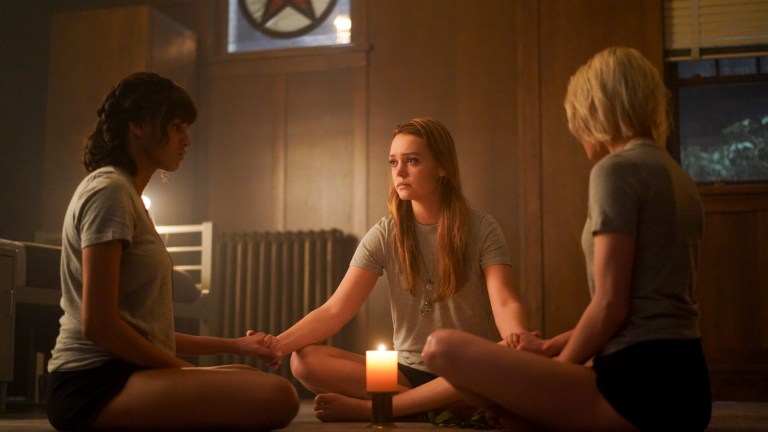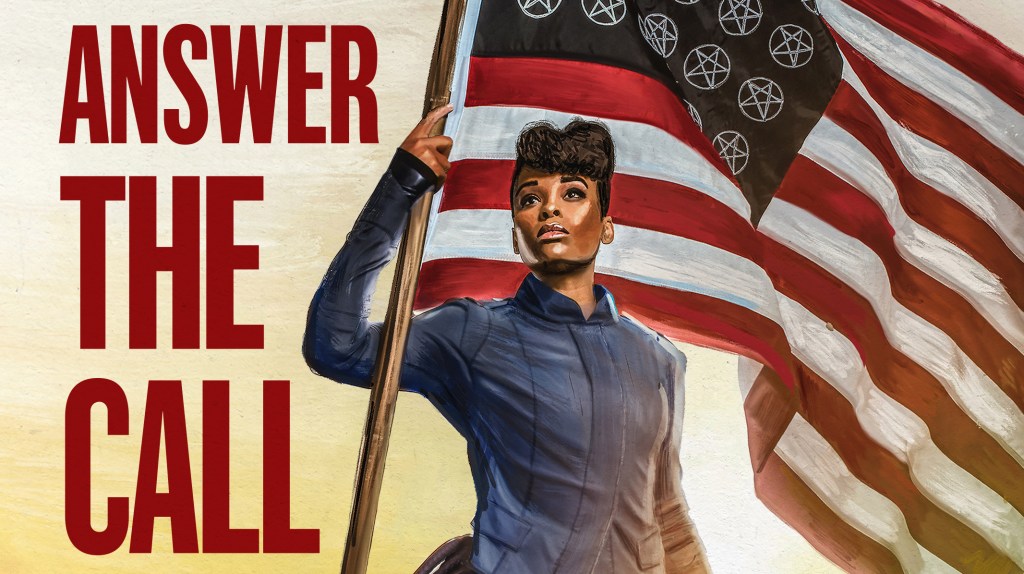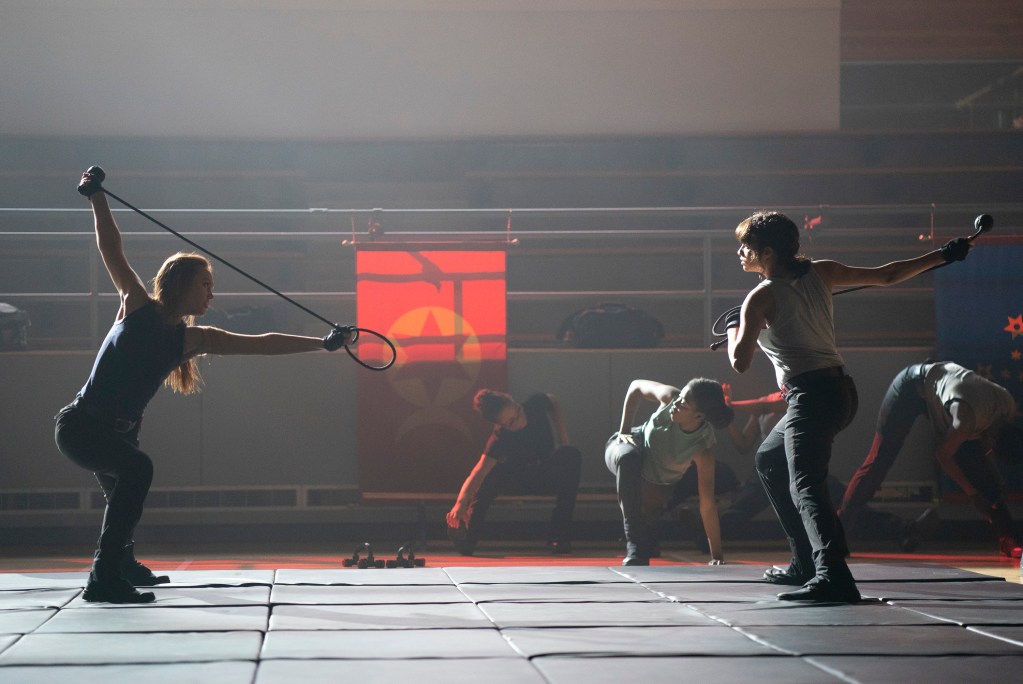Inside the World of Motherland: Fort Salem
Freeform's Motherland: Fort Salem imagines a United States where young witches fight all of Uncle Sam's enemies, foreign and domestic.

When Motherland: Fort Salem creator Eliot Laurence pitched his witches-in-the U.S.-military drama to Freeform, he presented the network with a helpful supplemental tool alongside it: a glossary.
Such is the scale and depth of detail for Laurence’s vision. Many TV shows use the question of “what if?” as a starting point. Very few TV shows, however, ride “what if?” questions to greater lengths than Motherland. This is a show that asks: what if the witches of Salem were actual magic-users? Then it asks what if they cut a deal with the U.S. government to avoid persecution by promising to fight their wars? And what if that arrangement persisted all the way to the present day and 18-year-old witches across the country entered into the Fort Salem military base to learn how to fight all of Uncle Sam’s threats, both foreign and domestic?
“Originally I was thinking about a witchy Gossip Girl with some sort of secret witch school in New York City that was very fancy,” Laurence says. “And it just wasn’t interesting to me. Then the military thing happened and it just had that kind of electric vibe that tells you you have something cool.”
Laurence did indeed have something cool…and also big. There are a lot of fascinating concepts floating around Motherland: Fort Salem’s magical alternate universe – so much so that Laurence originally envisioned the project to be a book, written in epistolary style via diary entries and military reports, Dracula-style.
“I chose the hardest possible way. It couldn’t be like a third-person omniscient. It had to be individual diaries,” Laurence says. “So we sent it around and universally everybody was like, ‘This is fucking cool.’ But nobody wanted to publish it.”
That idea eventually earned a powerful advocate in producer Kevin Messick who brought aboard his Gary Sanchez producing partners Will Ferrell and Adam McKay. Then the team eventually successfully pitched the project to Freeform.
Now Motherland: Fort Salem has 10 episodes to incorporate its many ambitious ideas into one season of television. It’s a tall order for the creators to be sure but is also an equally tall order for the viewer. Motherland: Fort Salem welcomes the audience directly into its vast world and invites them to catch up at his or her own pace. For those of you who’d like a primer before going in, however, Laurence, Messick, and Motherland’s full cast of witches were all nice enough to help explain the show’s many unique features.

The World of Motherland: Fort Salem
Similar to HBO’s Watchmen (and Alan Moore and Dave Gibbons’ comic before that), Motherland: Fort Salem is something of an alternative history exercise. Motherland differs from Watchmen though in that its timeline diverges from a fictionalized version of a real event. Like many other artistic pursuits before it, Motherland proposes that the “witches” of the Salem witch trials were not innocent women murdered by an oppressive society but rather real magical creatures.
“I’m a gay man and I grew up in like a very kind of repressed, Southern town. So I think just the ‘otherness’ aspect of witches always appealed to me,” Laurence says.
In the reality of the show, the witches avoided persecution altogether by cutting a deal with the U.S. government to provide magical martial support to the burgeoning country’s military and expansion efforts. The deal, known as the Salem Accord, was signed by witch representative Sarah Alder and the 13 colonies. The document eventually become a subsection of the U.S. Constitution, with provisions for the continued legal status of witches.
Understandably, that introduction of military witch might into the early history of the United States created a radically different country.
America is a more matriarchal culture in the world of Motherland: Fort Salem. Since women make up the most important specialized fighting force of the U.S. military (as witches are automatically enlisted in the army on their 18th birthday a.k.a. Conscription Day), matrilineal lines have become more important. Indeed it is the lines of matrilineal succession that determine witchood in the United States. Male witches once served in the Army alongside their female brethren but do so no longer due to plummeting birth rates.
The borders within the continental U.S. have also been tweaked in this new world. There exists a matriarchal culture near Sacramento known as the Matrifocal Allotment. A much bigger state, known as The Chippewa Cession, is a massive stretch of land bordered on the East by the Applachian mountains and on the west by the Mississippi River. The land was ceded back to Indigenous Tribal Federations in the 1830s in return for some magical help. That help includes magic that keeps the original Salem Accord signer, Sarah Alder, alive over 300 years later.
“Instead of giving Native American tribes these tiny, horrible reservations – a confederation of Native American tribes actually had a huge bargaining chip with the U.S. Government,” Laurence says. “Alder was dying and they needed to extend her, so she was able to make a deal with these confederated tribes to obtain a kind of magic that allowed her to kind of spread her age around a group of people.”
Alder is frequently accompanied by seven old women known as “Biddies.” The women, though they appear to be in their 70s or 80s, are actually in their early 20s. Together, they take on 40-50 years each of Alder’s extra years. Such is the nature of magic in this world – big gains require big sacrifices.
“(The idea of Motherland) was a nerd river and I just let go because the thing that lights me up more than anything is smart sci-fi,” Laurence says. “My goddesses are people like Octavia Butler and Margaret Atwood. I’m not saying this is smart sci-fi, but I try.”

The Characters of Motherland: Fort Salem
Into the strange new world of Motherland: Fort Salem step a handful of intriguing characters. Motherland is notable for having an all-women cast, led by a trio of young actresses: Taylor Hickson (who plays Raelle Collar), Ashely Nicole Williams (Abigail Bellweather), and Jessica Sutton (Tally Craven).
“Three is just a magical number. I guess Charmed did that through the power three will set you free, and comedy comes in threes. It felt like an essential number,” Laurence says.
Just as the actresses hail from disparate parts of the world (Hickson is from Vancouver, Sutton from South Africa, and Williams from Texas), so do their characters from all over Motherland’s altered United States.
Raelle is from the Chippewa Cession in North Carolina and lost her mother to the country’s witchy military machine. She views her Conscription as all little more than a death sentence.
Abigail comes from a blueblood family in a prestigious social caste of witches known as the High Atlantics. The military is almost literally in her blood.
“She was trained to be a fighter. She is the perfect soldier,” Williams says. “Abigail’s biggest thing is going from that queen bee-like nature to realizing that she cannot do this alone.”
Tally received a special dispensation from the military to avoid enlisting but opts to join on Conscription Day all the same.
“Because four of her sisters died it was deemed that her Matraline was too important to keep sending people out into combat. So she got a free pass but came anyway,” Laurence says.
“She’s just this compassionate curiosity personified,” Sutton says of her character. “She’s the bridge between the two forces that are Abigail as this leader and Raelle who’s like an alpha as well. It almost feels like she’s just intuitive or instinctual and she’s guided by her curiosity and her compassion for her team. She sees this as the greatest privilege.”
Beyond the three young leads, Motherland: Fort Salem makes room for other powerful figures in this world. Upon arrival at Fort Salem, Abigail, Raelle, and Tally meet the mysterious enlistee Scylla (played by Swedish actress Amalia Holm). Raelle and Scylla soon strike up a relationship.
“My character, I don’t think really has found the balance between pursuing her relationship so that it could be the healthiest it can be,” Hickson says. “As she begins to tilt more towards Scylla, as she falls for her more deeply, you start to see all of her decisions impact the success of the group.”
Also part of the cast is the original witch general herself, Sarah Alder (Belgian actress Lynn Renee), who proves to be an imposing presence among her youthful charges.
“I think her posture was one of the most important things,” Renee says of Alder’s imperial aura. “I’ve worked on the physicality of Alder, what she looks like, how she’s stripped from anything that makes her look too feminine. I didn’t want it to make her feel like a male entity. It’s just her posture and the old colonial style that seeped through her.”
At Alder’s side is the proverbial drill sergeant with a heart of gold, Anacostia (Demetria McKinney), who shares Alder’s last name.
“Anacostia was a fosterling. So there’s a lot to learn from and grow with her,” McKinney says. “I’m inclined to think that maybe Alder gave her that name because she chose to take her in as her own. We’re in a parallel universe where men are the caregivers for the children. I would love to see what my name was when I was becoming a fosterling and how it became Anacostia. It’s going to be a whole journey.”
Together this group of seasoned witch soldiers and trainees must confront the threat of The Spree, a pro-witch domestic terrorist organization hellbent on ending mandatory military conscription through any (usually violent) means.

The Magic of Motherland: Fort Salem
The final aspect crucial to understanding the culture and world of Motherland: Fort Salem is how the series approaches its magic. Every show, movie, or book about witches or other magicians needs a novel approach to magic and Motherland successfully brings something new to the table. In fact, the show rarely refers to its magic as magic.
“Eliot’s just taking it to that next fantasy level. He doesn’t even call magic, magic. He calls it work,” Sutton says.
“Work” on Motherland often means witches joining their voices together for musical incantations. The characters utilize “seeds” or “seed sounds,” which are 61 sacred noises tied to the Earth to create desired magical effects. Seeds can be layered together to create events like windshears (mystical shields), windstrikes (propulsive bursts of air), and many other curses, invocations, or spells useful to the martial and practical arts.
“The witches, the way that we fight is we sing storms. That’s basically how we defeat our enemies,” Renee says. “It’s an incredible thing to make a reality.”
In addition to the usual canon of seeds and spells, many witches at Fort Salem have their own specialties. The pilot reveals that Raelle is an adept healer or “Fixer,” while her burgeoning love interest Scylla is pretty much the exact opposite: a Necro. As the name implies, Necros are preoccupied with the arcane rules and uses of death, but stop short of being dead-raising necromancers. Though from the sound of things, something close to that is not out of the realm of possibility.
“In the series, there’s a big respect for death. But there’s also an understanding of it, especially in the necro department,” Holm says. “When something dies in nature, you can make something else grow out of it. It doesn’t have to be that it’s coming back into the same form. The necro department’s very advanced necro witches can actually almost bring a person back to life. It just comes at a cost. It depends also on how they died. Did they die from black magic or did they die from natural causes?”
Sometimes it can be easy for an enterprise this busy with other bits of world-building to view magic as an afterthought or worse: a crutch. But Motherland’s “work” is crucial to filling out the details of its massive world and contributing to the themes therein.
“I think it’s both figuratively and literally the power of voice,” Sutton says.
Or as McKinney puts it, “The magic isn’t your typical magic and this isn’t your typical show. (Laurence) spent nine years cultivating this world. And so when you find magic that is so deeply rooted in reality – we’re not David Copperfielding anybody.”
Motherland: Fort Salem premieres March 18 at 9 p.m. ET on Freeform.
